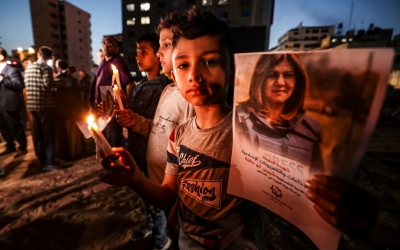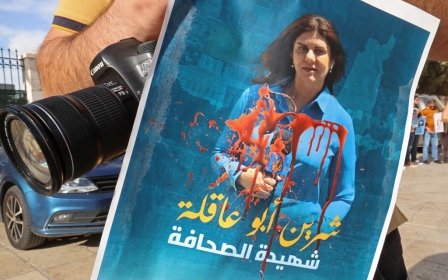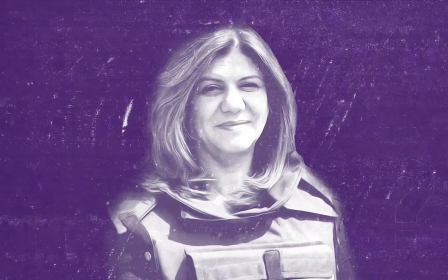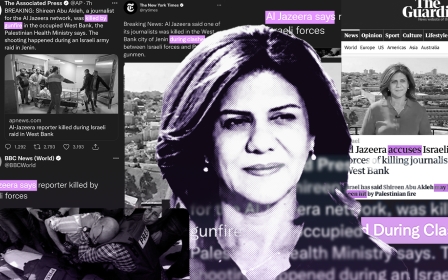Shireen Abu Akleh killing: How western media parrots Israeli propaganda
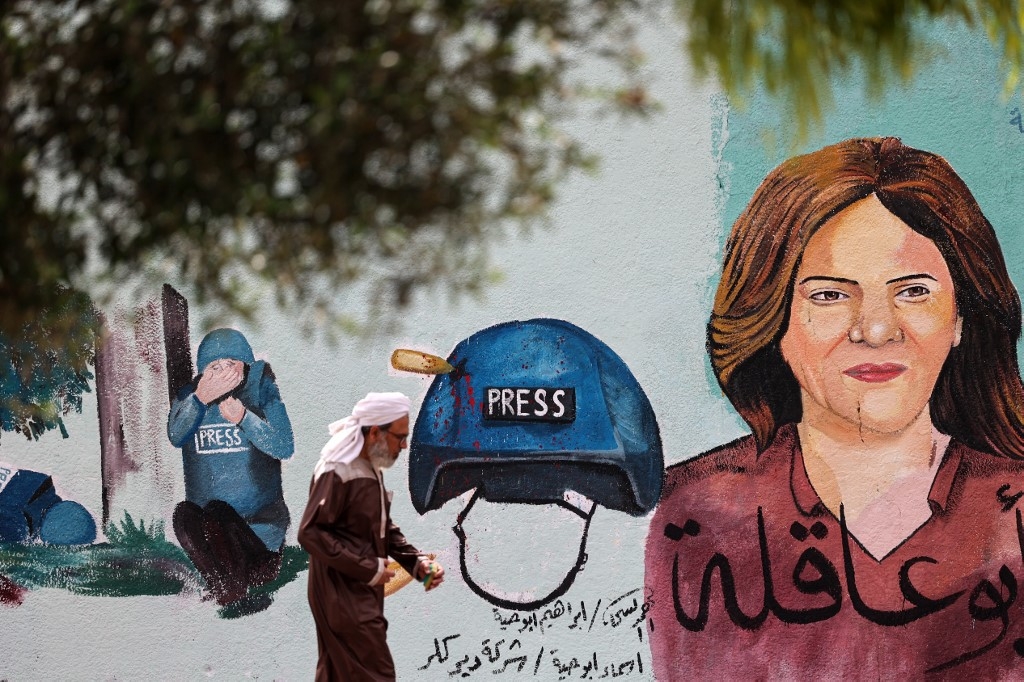
All of Palestine has united in shock this week to mourn the killing of iconic Al Jazeera journalist Shireen Abu Akleh. But amid our grief, we are forced to witness how western media outlets, yet again, are failing us.
When a Palestinian is killed by Israeli forces, the act is always described in passive terms. We just die on our own; no one kills us. Sometime, we die as collateral damage in “clashes”, with no context given as to how the altercation broke out or the power imbalance at play.
Then comes the automatic adoption of Israeli talking points, which are always manipulative. Israel’s strategy is to immediately deny responsibility, then to cast doubt on Palestinian testimonies, laying the groundwork for the assertion that there are “two versions” of the story. The media then repeats this uncritically.
On the day Abu Akleh was executed, I listened to the BBC World Service for a couple of hours. The reporter parroted the Israeli talking point that she was killed by Palestinian gunfire, then noted that Palestinians had said she was killed by Israeli fire. The report also included Israel’s assertion that it had called on the Palestinian Authority (PA) to conduct a joint investigation, but the offer was refused. The PA initially denied having been contacted by Israeli authorities, but the media continued to report what Israel had said.
Most international media adopted the same lines, almost as though they had written their pieces collaboratively on a joint Google doc.
While being sure to air all of Israel’s talking points, however, western media failed to give the same consideration to the Palestinian side. On Thursday, the PA explained why it had refused to participate in an investigation alongside Israel, seeking instead to probe the matter independently. Palestinians have every reason to distrust Israel, which habitually uses such investigations to bury cases - but western media do not appear to care about this vital context.
Digging deeper
The skewed coverage continued even during Abu Akleh's funeral. After Israeli forces attacked Palestinian mourners, with live footage showing a deliberate and unprovoked assault, major news outlets disingenuously wrote about "clashes" erupting, or "violence breaking out".
Indeed, most western media outlets draw from a standard playbook. Rather than digging deeper to find the truth and to challenge Israeli statements, reporters instead help Israel to shroud events in ambiguity. And no matter what comes next - even if the next story includes a line about the Palestinian response - the first impression has already been set.
In Abu Akleh’s case, little effort was needed to debunk the Israeli version of events. She was accompanied by several other journalists whose testimony aligned. They all said the same thing: Abu Akleh was targeted by an Israeli sniper. Unfortunately, it would seem that the words of Palestinian journalists are not sufficiently credible for western media.
This double standard exposes the complicity of western media in covering up Israeli crimes
Testimony from journalists such as Shatha Hanaysha, who was next to Abu Akleh when she died; Ali al-Samoudi, who was also shot and wounded in the incident; and Mujahid al-Saadi, who also witnessed the killing, are not accepted without further validation from Israeli rights groups such as B’Tselem or news sources such as Haaretz.
Even then, when the western media can no longer avoid exposing Israel’s lies, they may add a few lines to their stories here and there - but when the integrity of these stories is truly crucial, in the hours immediately following these types of events, reporters habitually stick to Israel’s propaganda. This, in turn, sticks in the minds of their readers and viewers.
When it comes to the Russia-Ukraine war, we do not see such hesitancy to put the responsibility where it lies. When journalists are killed in Ukraine, reports from western media immediately cite Russian shelling. Ukrainian sources and journalists are considered credible enough to quote on their own, and a Russian response is not needed, nor are there calls for an investigation to determine who was at fault.
This double standard exposes the complicity of western media in covering up Israeli crimes. Ending this complicity would not require much - just for international media to treat Palestinians, including journalists, with the respect they have earned.
The views expressed in this article belong to the author and do not necessarily reflect the editorial policy of Middle East Eye.
Middle East Eye propose une couverture et une analyse indépendantes et incomparables du Moyen-Orient, de l’Afrique du Nord et d’autres régions du monde. Pour en savoir plus sur la reprise de ce contenu et les frais qui s’appliquent, veuillez remplir ce formulaire [en anglais]. Pour en savoir plus sur MEE, cliquez ici [en anglais].



